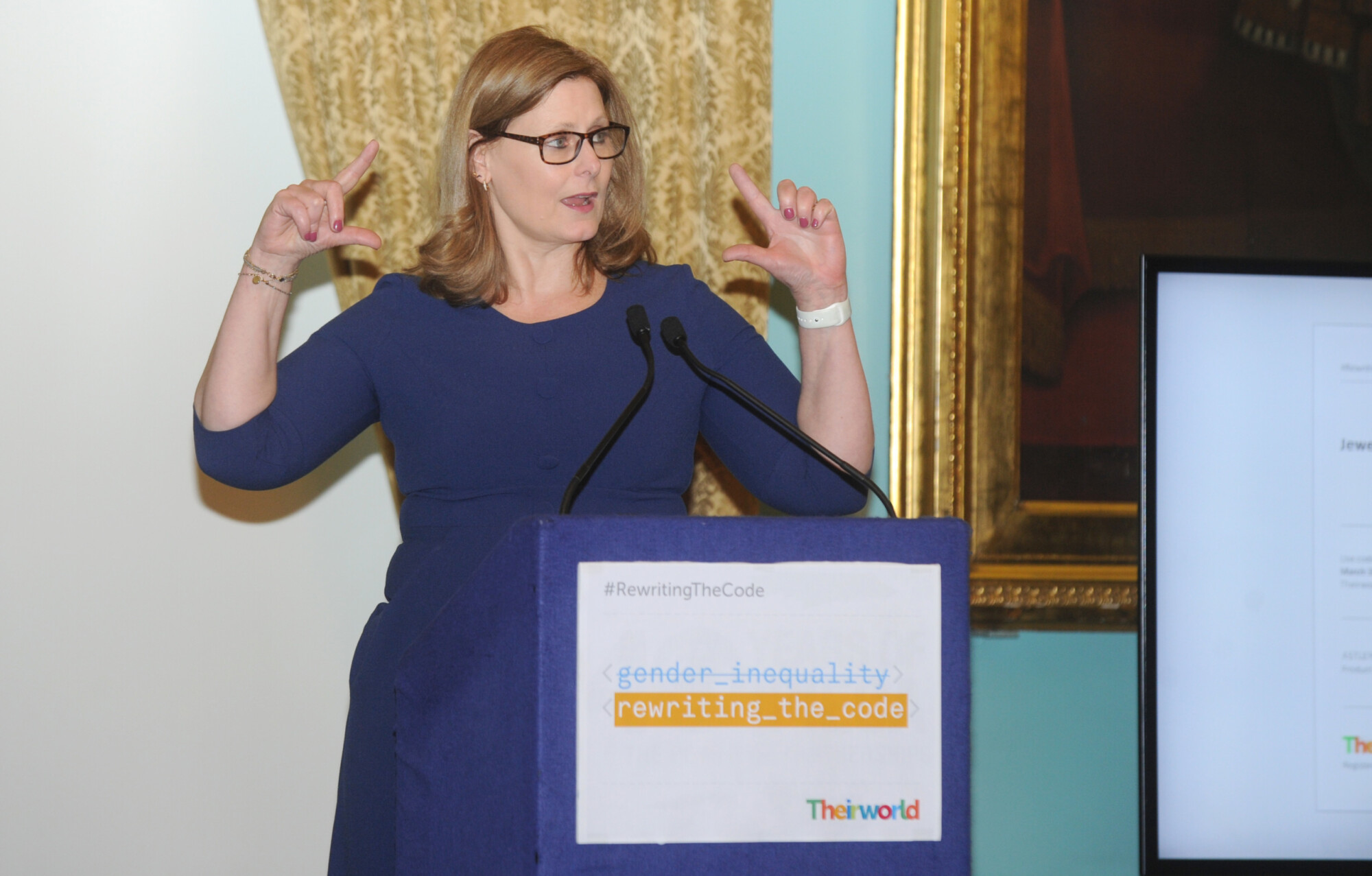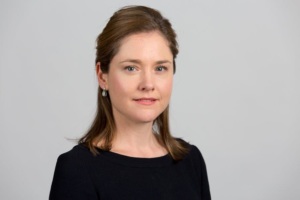The Potential to Effect Change in Education Can Only Happen in Collaboration with Others

Sarah Brown, President of Theirworld and Executive Chair of GBC-Education, speaking at Theirworld’s International Women’s Day Breakfast, Photo by Getty Images/Theirworld
Eclectic, upbeat and vivacious are some words that would describe the group gathered at the breakfast hosted by Sarah Brown, President of Theirworld and Executive Chair of the Global Business Coalition for Education (GBC-Education), to mark International Women’s Day.
Among those seated at my table was the CEO of Stemettes, whose vision is that girls make informed decisions about careers in science, technology, engineering, and maths (STEM), so that eventually women can be proportionally represented in the field. Elsewhere, leading female directors of FTSE financial, pharmaceutical and resources companies and renowned feminist authors and actresses discussed how to close persistent gaps in educational outcomes; how far society has come on diversity and inclusion; and outstanding challenges in both developed and developing societies. One firm conclusion reverberated in the room: for society to move forward, all roads lead back to improving education. Close the gap in educational outcomes, and governments and other institutional actors will have the best opportunity to address other deep inequalities and sustain a more equal society.
BHP Billiton Foundation joined GBC-Education as a member in 2017. The vision and purpose of GBC-Education sits squarely with that of the BHP Billiton Foundation’s Education Equity Global Program, and shares the goal of ensuring access to quality education for all young people.
Girls make up a large part of young people who are out of school and do not have access to a quality education. In fact, 53% of all children out of primary school and 52% of all adolescents out of lower secondary school are girls. Societal barriers, such as early marriage, a low value placed on girls’ education, and the opportunity and financial costs of sending girls to school drive many of these numbers.
Organizations like GBC-Education are seeking to take down these barriers and ensure access to education for girls around the world. On this International Women’s Day, GBC-Education and Theirworld have been taking part in the #RewritingTheCode campaign, which seeks to highlight and challenge the ingrained societal codes that prevent girls from receiving a quality education.
The BHP Billiton Foundation seeks to work with leading education organisations like GBC-Education to amplify its own endeavours in addressing access to education. The Foundation already engages with international institutions, industry, government, global policy makers and civil society organisations; membership in GBC-Education provides greater opportunities to connect and cooperate through a broad network that goes beyond the Foundation’s existing ambit.
Laid bare, the evidence on education and opportunity tells us that inequality in life outcomes is increasing: the world’s poorest children are four times more likely not to go to school than the world’s richest children, and five times more likely not to complete primary school. Gaps persist despite the commitment and financial investment by public, private, and civil society sectors to improve the picture. The BHP Billiton Foundation seeks to close the gap and identify a new collective approach, collaborating with leading organisations and partners like GBC-Education to help research the issues and identify what works.
The BHP Billiton Foundation can act at scale to make a distinctive contribution to global progress. Its investments, geographical reach and combined focus on transparency and performance are strong assets that are amplified when combined with GBC-Education’s network and resources. The Foundation recognises that the potential to effect change can only happen in collaboration with others. GBC-Education’s expertise will help to guide our future investment decisions based on the principles of inclusion and innovation. When it is time to talk about these issues at International Women’s Day in 2018, the aim is that the BHP Billiton Foundation will have even more to contribute to the debate around education equity, guided and informed by the expertise of its partners.

Jo Cox, MP, celebrating her marriage with some of the many women who love and continue to be inspired by her (Approval for use of the photo provided by Jo’s husband)
The International Women’s Day breakfast concluded on a high note with an award to the leading and lesser-known female figures from the White Helmets movement, a Syrian civil volunteer group. My late friend Jo Cox MP was a huge supporter of the White Helmets and of equality generally; since Jo and I first met in 2000, working in adjacent offices in the European Parliament in Brussels, she lived and breathed equality (her wedding was themed in suffragette colours, as seen in the picture here). As Sarah Brown, Executive Chair GBC–Education, remarked at the end of the breakfast, you can’t really talk about education and equality without a reference to Jo being somewhere in there.

Rosie Donachie, Head of Corporate Affairs, Europe, BHP Billiton (on behalf of the BHP Billiton Foundation).
Rosie Donachie is Head of Corporate Affairs, Europe, at BHP Billiton, the world’s largest resources company. She leads engagement with the UK government, the EU and broader corporate affairs stakeholders; prior to joining BHP Billiton She was Head of European Affairs at Kingfisher Plc.
Rosie was a senior adviser in the Prime Minister’s Strategy Unit and the Behavioural Insights Team (2008-2011), for Prime Ministers Gordon Brown and David Cameron. She was awarded a U.K. Government scholarship to study a Master’s Degree in European Politics at the College of Europe, Bruges, and commenced her career in the EU, as a political adviser on employment and social affairs in the European Parliament. She has an MA in Politics from the University of Edinburgh and a diploma in political science from the Institut d’Etudes Politiques, Grenoble.
